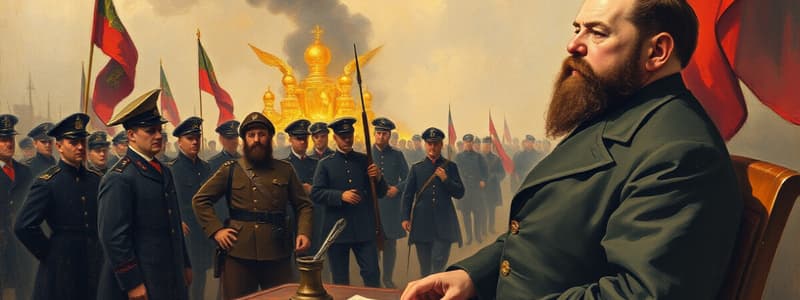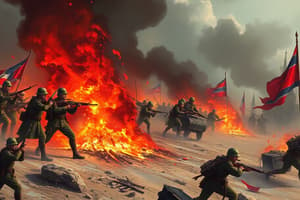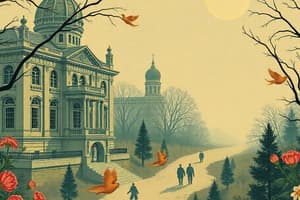Podcast
Questions and Answers
What were the primary reasons soldiers were unhappy fighting in the war?
What were the primary reasons soldiers were unhappy fighting in the war?
Soldiers were unhappy due to a lack of resources and support, coupled with the desire to avoid a war of attrition.
How did the loyalty shift of the Russian army impact Tsarist power?
How did the loyalty shift of the Russian army impact Tsarist power?
The shift in loyalty towards the revolutionaries led to the collapse of Tsarist power.
Why were Russia's industries inadequate during the war?
Why were Russia's industries inadequate during the war?
Russia's industries were few in number and suffered from disrepair and a lack of supplies due to German control of the Baltic Sea.
What were the consequences of railway breakdowns by 1916?
What were the consequences of railway breakdowns by 1916?
What was the impact of labor shortages on small workshops in Russia?
What was the impact of labor shortages on small workshops in Russia?
How did military demands affect agricultural supplies in Russia?
How did military demands affect agricultural supplies in Russia?
What difficulties did the Russian army face in acquiring industrial equipment?
What difficulties did the Russian army face in acquiring industrial equipment?
As a general, what recommendations might you make to improve the situation?
As a general, what recommendations might you make to improve the situation?
What were the key demands outlined in Lenin's April Theses?
What were the key demands outlined in Lenin's April Theses?
How did Lenin suggest the Bolshevik Party should rename itself and why?
How did Lenin suggest the Bolshevik Party should rename itself and why?
What was the initial reaction of the Bolshevik Party to Lenin's April Theses?
What was the initial reaction of the Bolshevik Party to Lenin's April Theses?
What developments during the summer influenced the Bolshevik Party's attitude toward revolution?
What developments during the summer influenced the Bolshevik Party's attitude toward revolution?
Describe the role of Soviets as mentioned in the context of Lenin’s July actions.
Describe the role of Soviets as mentioned in the context of Lenin’s July actions.
What was the significance of factory committees during this period?
What was the significance of factory committees during this period?
How did soldiers' committees contribute to the changing political landscape?
How did soldiers' committees contribute to the changing political landscape?
In what way did the mood of the workers change during the summer of 1917?
In what way did the mood of the workers change during the summer of 1917?
What significant action did the Bloody Sunday and the Revolution of 1905 take in Petrograd?
What significant action did the Bloody Sunday and the Revolution of 1905 take in Petrograd?
What occurred on March 2, 1917, regarding the Tsar?
What occurred on March 2, 1917, regarding the Tsar?
What was the Bolshevik uprising of October 24, 1917, primarily characterized by?
What was the Bolshevik uprising of October 24, 1917, primarily characterized by?
What major conflict took place between 1918 and 1920 in Russia?
What major conflict took place between 1918 and 1920 in Russia?
What area did the Bolsheviks control by December 1917?
What area did the Bolsheviks control by December 1917?
What significant change happened to industry and banks in November 1917?
What significant change happened to industry and banks in November 1917?
What was the purpose of forming the Comintern in 1919?
What was the purpose of forming the Comintern in 1919?
What initiative began in 1929 aligned with the Bolshevik policies?
What initiative began in 1929 aligned with the Bolshevik policies?
What was one significant reason for the 550 stoppages of work in the first year?
What was one significant reason for the 550 stoppages of work in the first year?
How did the winter conditions impact workers' daily lives?
How did the winter conditions impact workers' daily lives?
What educational opportunities were made available to factory workers and peasants?
What educational opportunities were made available to factory workers and peasants?
What social support was provided for the children of women workers?
What social support was provided for the children of women workers?
What healthcare system was provided for the workers?
What healthcare system was provided for the workers?
What does the letter from the child reveal about the socio-economic conditions in Soviet Russia?
What does the letter from the child reveal about the socio-economic conditions in Soviet Russia?
How were living quarters described for workers during the harsh winter conditions?
How were living quarters described for workers during the harsh winter conditions?
What was the overall effect of government resources on the initiatives for workers and their families?
What was the overall effect of government resources on the initiatives for workers and their families?
What were the reasons behind soldiers deserting the Russian army during the Bolshevik uprising?
What were the reasons behind soldiers deserting the Russian army during the Bolshevik uprising?
How did non-Bolshevik socialists and liberals respond to the Bolshevik uprising?
How did non-Bolshevik socialists and liberals respond to the Bolshevik uprising?
Who were the 'greens' and what was their political stance during the conflict?
Who were the 'greens' and what was their political stance during the conflict?
What role did foreign troops play in the Russian Civil War?
What role did foreign troops play in the Russian Civil War?
What was the impact of land redistribution ordered by the Bolsheviks on the Russian army?
What was the impact of land redistribution ordered by the Bolsheviks on the Russian army?
Describe the perspective of an estate owner during the Bolshevik uprising.
Describe the perspective of an estate owner during the Bolshevik uprising.
What might a small peasant hope for during the events described in the document?
What might a small peasant hope for during the events described in the document?
As a journalist during the Civil War, what key event might you report on?
As a journalist during the Civil War, what key event might you report on?
Flashcards are hidden until you start studying
Study Notes
Impact of World War I on Russia
- The Russian army, largely unprepared, faced shortages in resources and equipment.
- By 1916, the country’s industrial capacity had severely deteriorated due to lack of supplies from abroad.
- Railways were breaking down, leading to transport issues and inadequate movement of troops and goods.
- Labour shortages resulted from conscripting able-bodied men into the military, causing small workshops to close.
Lenin and the Bolsheviks
- Lenin opposed the war from its onset in 1914 and advocated for a socialist revolution.
- Key demands from Lenin’s ‘April Theses’ included ending the war, land redistribution to peasants, and nationalisation of banks.
- He suggested renaming the Bolshevik Party to reflect its radical goals.
Workers' and Soldiers' Movements
- Spring and summer of 1917 saw increased activity among workers, with committees forming to challenge industrial management.
- The number of trade unions multiplied, showcasing a workers’ movement gaining momentum.
- Soldiers' committees emerged, reflecting widespread dissent within the army.
Revolution of 1917
- On March 2, Tsar Nicholas II abdicated, marking a pivotal shift in power.
- The Bolshevik uprising on October 24 began with coordinated actions from Soviet representatives.
- By December 1917, the Bolsheviks had solidified control over key areas like Moscow and Petrograd.
Nationalisation and Land Redistribution
- The Bolsheviks opposed private property; most industries and banks were nationalised following the revolution.
- Land redistribution began, leading to unrest among soldiers who wished to return home.
Civil War (1918-1920)
- The Civil War saw the 'reds' (Bolsheviks) fighting against the 'whites' (pro-Tsarist forces), supported by foreign powers.
- Workers faced harsh living conditions, with severe cold affecting basic living conditions.
- An education system expanded to include factory workers and peasants, with initiatives like crèches for working mothers.
Social Changes and Challenges
- The Bolsheviks aimed to reform societal structures, providing public healthcare, model housing, and educational opportunities.
- Resources were limited, leading to uneven progress in these areas.
- Some children struggled to access education due to poverty, illustrating ongoing hardships despite the goals of the revolution.
Studying That Suits You
Use AI to generate personalized quizzes and flashcards to suit your learning preferences.




